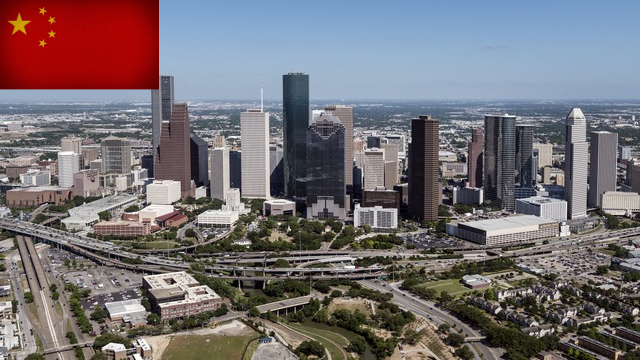
The U.S. has ordered China to shutter its consulate in Houston by Friday citing concerns over espionage, the Department of State said Wednesday, prompting a vow by Beijing to retaliate in kind, as relations between the two superpowers hit a new low.
“We have directed the closure of PRC Consulate General Houston, in order to protect American intellectual property and American’s private information,” State Department spokesperson Morgan Ortagus told RFA’s Mandarin Service in an emailed statement, referring to the official name of the People’s Republic of China.
Ortagus cited China’s “violations of our sovereignty and intimidation of our people,” and said that under the Vienna Convention—which both countries are party to—diplomats must “respect the laws and regulations of the receiving State” and “have a duty not to interfere in the internal affairs of that State.”
Separately, another State Department spokesperson told RFA that China has “engaged for years in massive illegal spying and influence operations throughout the United States against U.S. government officials and American citizens,” adding that such activities had increased significantly in scale and scope over the past few years.
“As detailed by Secretary of State [Mike] Pompeo, FBI Director [Christopher] Wray, and Attorney General [William] Barr in public remarks, PRC officials have interfered in our domestic politics, stolen U.S. intellectual property, coerced our business leaders, threatened families of Chinese Americans residing in China, and more.”
After being informed by the State Department late on Tuesday that the consulate in Houston had until 4:00 p.m. on Friday to vacate, Chinese officials were seen stuffing what appeared to be documents into burning barrels in the building’s courtyard, according to local media reports. Emergency services responded to calls about billowing smoke in the area, but did not enter the compound, over which China has sovereignty.
China operates an embassy in Washington, as well as consulates in the U.S. cities of Houston, New York, Chicago, Los Angeles, and San Francisco. The consulate in Houston, which mostly issues visas for applicants in the southern states, was the first to be opened in the U.S. by Beijing after Washington officially recognized the People’s Republic of China in 1979.
The move is the latest in a series of Trump administration actions targeting China, ranging from sanctions over China’s imposition of harsh security laws in Hong Kong and over human rights abuses against Muslim Uyghurs in Xinjiang to public denunciations of Chinese territorial claims in the South China Sea.
It also came on the same day that a U.S. grand jury indicted two hackers affiliated with China’s Ministry of State Security for a 10-year global campaign in which they broke into computer systems of hundreds of companies, and recently targeted firms researching a coronavirus vaccine.
Speaking on a visit to Denmark on Wednesday, Pompeo said the move was part of a U.S. strategy to “[set] out clear expectations for how the Chinese Communist Party is going to behave.”
“And when they don’t, we are going to take action to protect the American people, protect our national security and also protect our economy and jobs,” he said. “That’s the actions that you’re seeing taken by President Trump, we’ll continue to engage in this.”
Support for order
The order to close the consulate was welcomed Wednesday in a tweet by republican Senator Marco Rubio of Florida, a vocal critic of China’s policies and a co-chair of the bipartisan Congressional-Executive Commission on China (CECC).
“#China’s consulate in #Houston is not a diplomatic facility. It is the central node of the Communist Party’s vast network of spies & influence operations in the United States. Now that building must close & the spies have 72 hours to leave or face arrest. This needed to happen,” he wrote.
He was joined by Republican Senator Marsha Blackburn of Tennessee, who in December was among a group of lawmakers who called on the International Olympic Committee (IOC) to speed up implementation of an agenda requiring host cities to adhere to rights protections ahead of Beijing’s Winter Games in 2022, citing reports of widespread abuses in Xinjiang.
“China is stealing our intellectual property and engaged in massive spying and influence operations throughout the United States. The mass burning of documents last night at China’s consulate in Houston hours after its ordered closure reinforces this point. What are they hiding?” she tweeted.
The decision was also applauded by Dolkun Isa, president of the Munich-based World Uyghur Congress (WUC) exile group, who called it “bold” and said that China had been using its diplomatic missions to spy on members of the Uyghur diaspora, particularly in the U.S., Sweden, and Germany.
“Furthermore, Chinese diplomatic missions play roles in harassing, intimidating, and even threatening Uyghur, Tibetan, Mongolian, and Chinese activists for speaking out against China’s massive human rights violations in East Turkestan, Tibet, Southern Mongolia, and China,” he said, using the names preferred by Uyghurs and Mongolians for their traditional homelands.
Isa urged European governments to follow suit and close Chinese diplomatic missions that “operate as spy agencies.”
“European nations have been fully aware of the nefarious roles of Chinese diplomatic missions for years,” he said.
“These missions threaten the national security of European democracies through spying activities and the stealing of European intellectual property.”
Chinese response
China’s Foreign Ministry responded swiftly, with spokesman Wang Wenbin calling the move an “unprecedented escalation” and a “violation of international law and the basic norms of international relations.” The U.S. should “immediately withdraw its erroneous decision,” Wang told a regular press briefing in Beijing on Wednesday.
He said that U.S. agents acted in violation of the Vienna Convention by “opening diplomatic bags” in October 2019 and in June this year, and vowed that if the order to close the consulate was not revoked, “China will certainly engage in a proper and necessary response,” suggesting that Beijing could close a U.S. consulate.
In addition to its embassy in Beijing, the U.S. operates consulates in the Mainland Chinese cities of Guangzhou, Chengdu, Shanghai, Shenyang, and Wuhan. The Wuhan consulate was evacuated by U.S. staff after it became the epicenter of the coronavirus outbreak in late 2019.
Hu Xijin, an editor with China’s official Global Times newspaper, called the decision “crazy” and the accusations of spying “flippant” in posts to Twitter. The Times tweeted a poll asking, “which US consulate general in China is most likely to be closed?” with respondents selecting “Hong Kong & Macao.”
Experts say relations between the U.S. and China are the worst they’ve been in four decades.
Earlier this month, Trump’s administration leveled sanctions against several top Chinese officials deemed responsible for rights violations in Xinjiang, including regional party secretary Chen Quanguo, under the Global Magnitsky Human Rights Accountability Act.
The move, which marked the first time Washington had sanctioned a member of China’s powerful Politburo, was followed by similar sanctions against Chinese officials seen to be responsible for recent heavy restrictions on the autonomy of Hong Kong.
Last week, China’s Foreign Ministry announced retaliatory sanctions targeting several republican lawmakers, Ambassador-at-Large for International Religious Freedom Sam Brownback, and the bipartisan Congressional-Executive Commission on China advisory panel.
Reported and translated by Rita Cheng for RFA’s Mandarin Service and Alim Seytoff for the Uyghur Service. Written in English by Joshua Lipes.
Source: Copyright © 1998-2016, RFA. Used with the permission of Radio Free Asia, 2025 M St. NW, Suite 300, Washington DC 20036. https://www.rfa.org.












